The need for law firm marketing is growing exponentially.
The importance of lead conversion for law firms has never been greater. And closing more high value clients is paramount to the growth of law firms.
Every lawyer knows what it’s like to pursue a prospect and then have that live lead go dead. It’s the worse thing — especially after spending your marketing dollars on acquire the lead.
There are many reasons why your leads don’t close.
Maybe they chose another law firm, or they thought they could handle it themselves. Maybe their problem went away.
It’s hard to start a law firm — or grow the one you have — if you’re not consistently getting new retained clients.
The reason that prospect did not become clients doesn’t matter after the fact. What matters is that you stop hoping to land new clients and start implement these proven strategies that will turn your prospects into retained law firm clients:
1. Make sure your prospects are worth your effort
I get super excited every time I get an email from a potential client showing interest in hiring my ad agency.
We put a lot of effort it driving these leads — so naturally, it’s great to see these in my inbox every day.
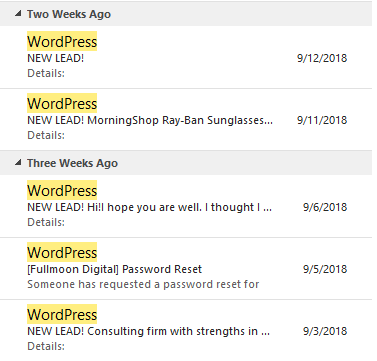
Let’s face it. Your law firm needs to generate new clients to grow your business — of course, while helping your clients’ cases.
Your law firm might work on a few pro bono cases, but you need to keep your office lights on and pay your employees. Therefore, you cannot be wasting your resources on clients that are not profitable for your law firm.
If a prospect cannot afford you or your firm isn’t equipped to help them, chasing them is a waste of time and money.
This is why developing your ideal client profile is critical to running sustainable law firm.
Once you figure out the profile of clients you need, start by creating a process to quickly validate your prospects and disqualify leads that do not meet your desired criteria.
So how do you build this client profile?
Great question.
You can start by building your law firm personas — allowing you to identify specific characteristics of the audience you law firm will serve best.
There is no secret creating personas, no magic formula. All you’re really defining is the who, what, why, and how for each of your personas. It can get as detailed as you want it to — there’s no hard and fast rule about what you should or should not add to your persona definitions.
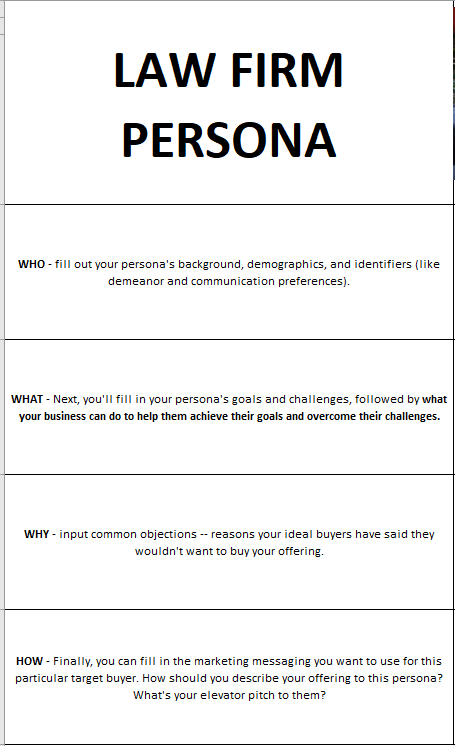
You should see by now that a thorough definition of your law marketing personas can only make your marketing strategy better and get more qualified leads that have a higher probability to convert into paying clients.
2. Build your brand
Many years ago, attorneys grew their law firm through word-of-mouth and personal referrals from clients.
Law firms are no different than a retail brand — you need to build a brand. And by that I mean creating a company that creates a great experience for your clients and solve their problems and address their needs.
The good news is searching in google for “how to build a law firm brand” returns a plethora of companies and resources that can help you build your law firm’s brand.
The bad news is there’s so many of them out there, it could drive nuts just trying to figure out which ones you should listen to.
But don’t worry. That’s why I am writing this article to help you decode and simplify what you can do to build your brand.
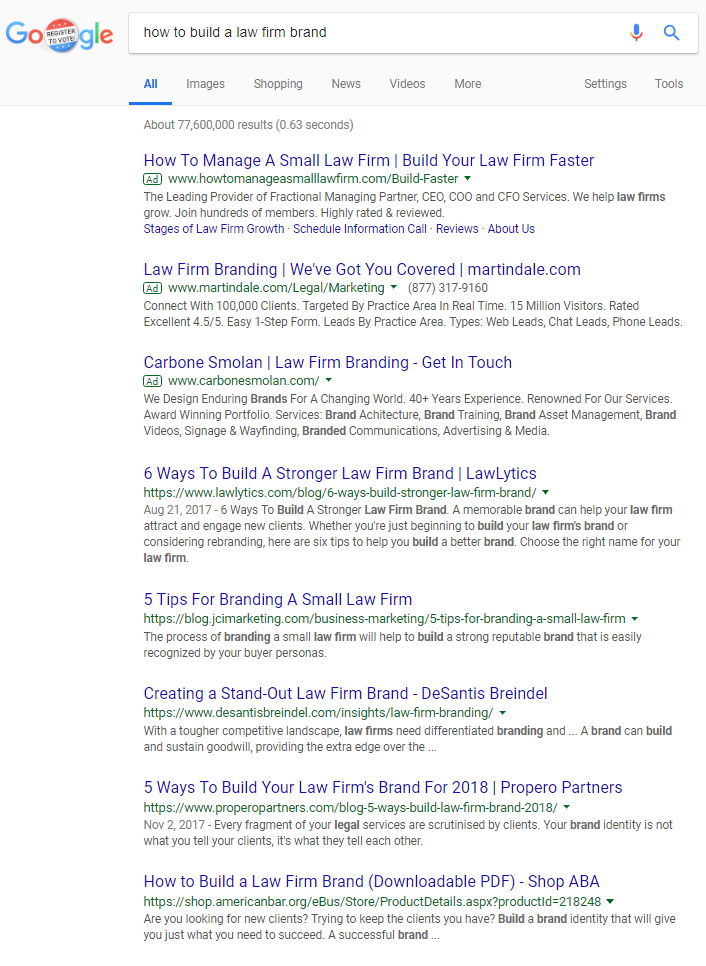
When I was looking for a corporate lawyer for legal help with Fullmoon Digital, my friends sent me lawyers they know or have worked with before. So, word-of-mouth is still an effective way for law firms to get new clients.
There are obviously many channels to build your brand on. But social media is by far the channel you can get the best reach on. That means, you will put your law firm in front of the most people with the right social media strategy.
Over the past few years, social media can no longer be ignored.
Business of all sizes are vulnerable and transparent in social media whether by choice or not. What do I mean? Your business have no control over what your customers post on their social media pages. And there’s not much you can do about it.
We no longer give social media a second thought today. It’s completely integrated into our lives and we rely on social media to communicate, learn, and discover.
Consequently, what people say about your business matter. As a law firm, your client reviews can make the difference between being hired or not.
Whether you like it or not, think it’s wrong or right, your prospects will draw conclusions from what they read or see on social media.
If it sounds like building your law firm brand is complex. That’s because it is and growing in complexity as technology continues to expand and innovate at lightning speed.
You are being judge by every visitor
The quality of your website, blog, marketing materials, business card, and even the way you dress will be judged.
First, assess your competition. Identify areas where you are different and better. Then communicate to your prospects so they have complete confidence to work with law firm.
You need to be where your prospects are on social media, with both organic and paid posts.
Add content regularly to your website and social media pages through blogging.
3. Nurture your leads
One guarantee I will give you is your window you have to engage and close a lead is very small. If you do not take action fast enough, your lead will move on to the next law firm for help.
Needless to say, that prospects looking for an attorney are usually in a pinch and want immediate consult.
According to inbound marketing firm HubSpot, companies with effective lead nurturing programs:
- generate 50% more sales at a 33% lower cost
- nurtured leads make 47% larger purchases
- 451% increase in qualified leads
Those are impressive numbers and a great reason to make sure you have a system and process in place to nurture your leads.
All the lead nurturing sounds like something your law firm should do. Right? 100%.
So how can your law firm achieve results beyond your expectation? Marketing automation.
What is marketing automation?
According to HubSpot,
Marketing automation refers to the software that exists with the goal of automating marketing actions. As a result, many marketing departments have to automate repetitive tasks such as emails, social media, and other website actions. The technology of marketing automation makes these tasks easier.
Nurturing leads through marketing automation is complex and requires commitment of time and money.
Marketing automation strategy can nurture those leads into high value paying clients if your law firm’s website is producing a steady flow of inbound content marketing leads through organic search.
Here are a few questions to ask yourself when deciding if marketing automation is the right move for your law firm.
- Do you have an efficient and consistent content strategy mapped to your prospect’s journey?
- Are you generating a steady flow of new and qualified inbound leads?
- Is your sales team overwhelmed with the number of quality leads you’re passing along to them?
- Do you have a proven lead nurturing strategy that you want to scale?
- Has marketing and sales agreed on what conversations should happen with marketing and which with sales?
Don’t get me wrong. These are great questions and problems to have.
Therefore, it’s important to understand that marketing automation does not do marketing for you, but can help scale your successful efforts.
Law firms that use marketing automation experience better quality leads and higher closing ratio.
4. Find and focus on a niche
A generalist is not desirable when prospects are looking for specialists to work on their case.
Consequently, focusing on very specific areas of the law bodes with other law firms as well — since they are more likely to refer clients to you in cases they are not experts in.
Contrary to what marketers say, specializing in a niche will establish your law firm as the go-to for your area of expertise.
Let’s say that prospects are searching for lawyers specializing in a sexual harassment cases.
First, they will search for “sexual harassment lawyers” in Google.
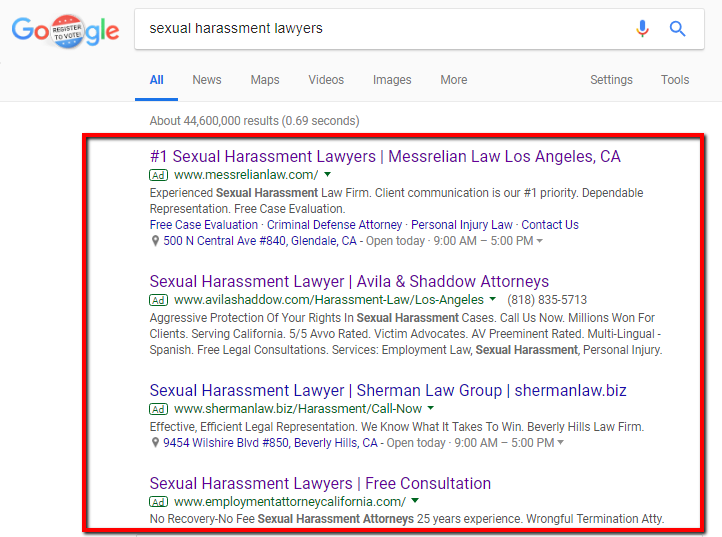
Second, the prospects will click to several law firm websites to review services and case studies.
Let’s take a brief look at a couple of ad copy and landing pages
Here’s where you’re going to find even more value in this article. Why?
Instead of just going through these points quickly, I’ll take this opportunity to also a few of these landing pages set up by the law firms.
I believe your law firm will benefit tremendously from this segue and even use these tips to improve your Google ads campaign and drive more qualified leads.
The first ad I clicked on is Messrelian Law website.
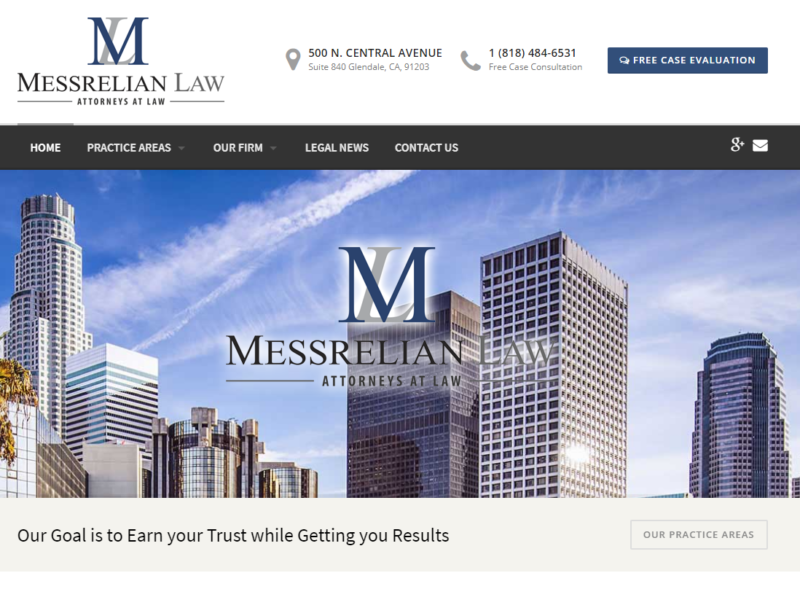
Good: They are ranking #1 for a competitive term. Albeit they are paying a high average cost per click. Their ad copy is relevant to the search term. As a prospect, I know they claim to be the #1 sexual harassment lawyer and have years of experience. They’re also offering free consult. All great things that would get a healthy number of clicks.
Bad: The ad click took me to the homepage. The homepage doesn’t align with the ad copy. I certainly didn’t see any mention of “sexual harassment” on the page — the specific type of lawyer I was looking for. Instead, I have to click on the Practice Areas drop down menu, the click on Employment Law.
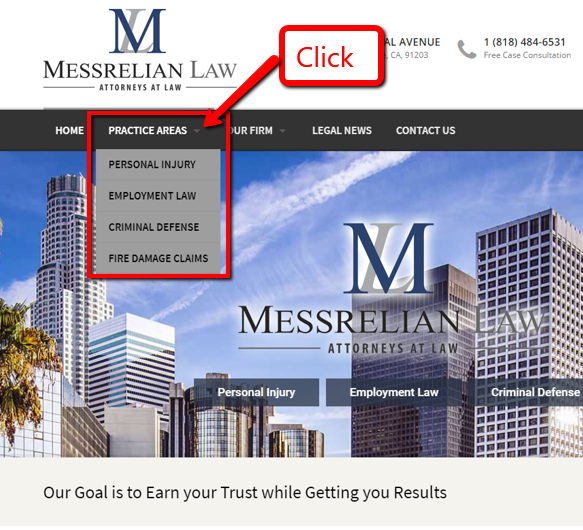
Click on the employment law takes me to a page full of content — but as detailed as it is, I still had to scroll half way down the page to find what I was search for in the first place.
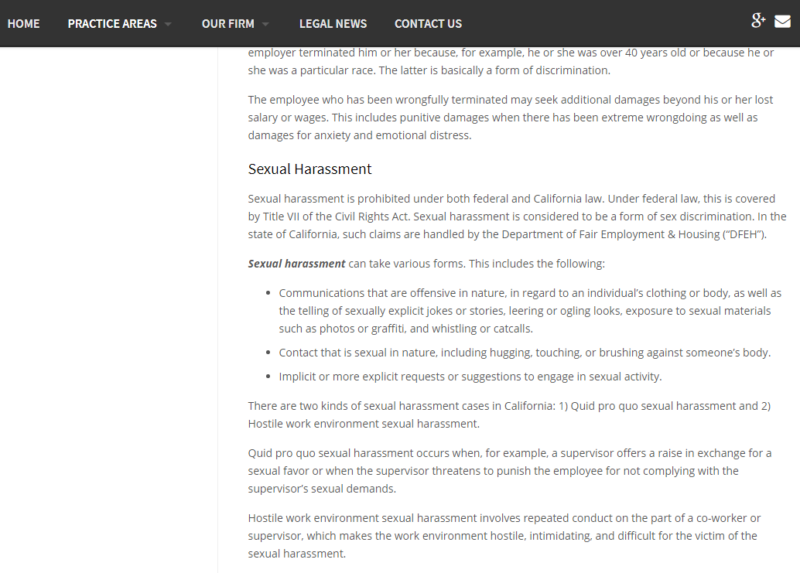
The biggest miss for Messrelian Law firm is the lack of a contact form to capture the lead. Why? Remember the amazing ad copy I talked about earlier? Another feature that’s missing from the Messrelian law firm is leveraging Google Ads’ call extension to add their phone number.

Nowhere did I find “Free Case Evaluation” during my entire click journey. This can cause a huge loss in leads because of the lack of continuity and leading the prospect from click to lead.
Pro tip: Don’t underestimate this fundamental tactic. Make sure all your prospects epxerience from ad to landing page to lead form are aligned. A disconnected funnel is a complete was of your advertising dollars, your prospects time, and your time.
The next sexual harassment lawyer ad I clicked on was Avila & Shaddow law firm.
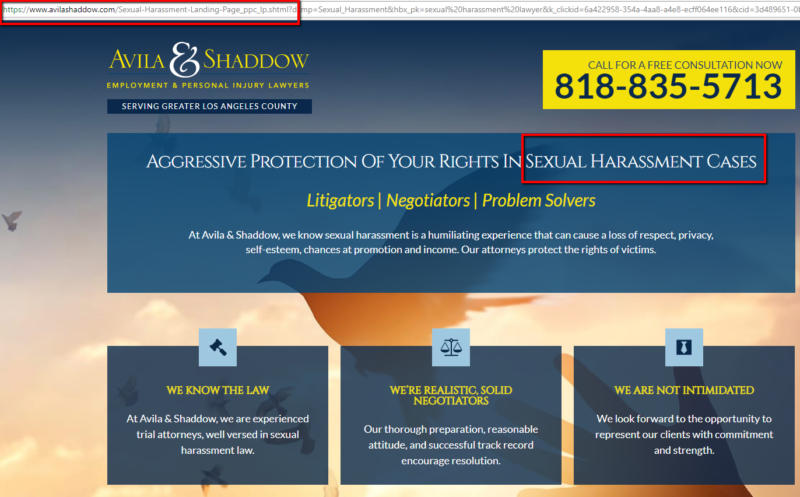
Good: What I like about Avila & Shaddow is that they have created a specific landing page to drive traffic to. With direct response lead generation campaigns, a landing page is recommended so you can control the entire journey of your visitors.
In their ad copy, they are emphasizing that their law firm have won many cases to the tune of millions. That builds tremendous credibility. Additionally, if your law firm has created a Avvo profile, calling it out in your ad copy is helpful as well — Avila & Shaddow definitely took advantage by adding their Avvo ratings to the ad copy.

The have a well laid out contact form to capture leads. I’m not too keen on their call-to-action with the “Call 818-835-5713 Now” as it seems odd to have your prospect fill out a form and then tell them to call you???
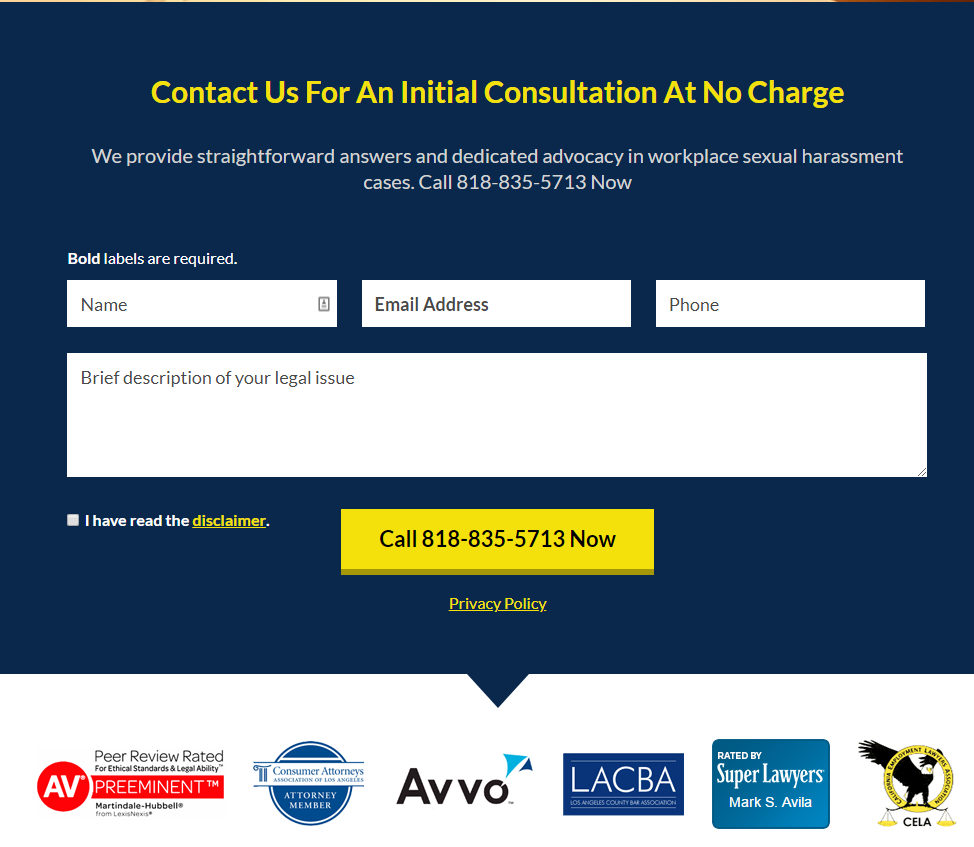
Bad: Not necessarily a bad thing, but Avila & Shaddow could test the form above the fold. In a mobile experience, the form might be too far down. Every little obstruction can cause your lead conversion rate to suffer.
Before we move on, I hope these examples have given you some insights and useful action items for your own ad copy and landing pages.
Now back to our final point.
Finally, if the information on your website is convincing enough, the prospect will submit their contact information only to websites that clearly articulate how they can help their case. As a result, this prospect becomes a lead for your law firm to nurture.
Focusing on your niche will ensure you are maximizing the prospects path to conversion.
Jack of all trades, master of none
Although serving every possible prospect and taking on any case sounds like a great idea, establishing your expertise actually helps you focus your marketing efforts.
Instead of spending your marketing dollars everywhere, your area of focus will get 100% of your marketing investment and generate better leads and retain more clients. Consequently, you will start to see growth in similar clients come to your law firm — because they deem you as the expert who can help them with their case.
Find commonalities among your highest value clients and let your niche uncover itself and guide your law firm marketing strategy.
When you combine your niche and targeted marketing strategy, prospects will readily come to you.
5. Educate your prospects instead of trying to close them immediately every time
This is counter intuitive since every law firm wants to get as many leads as possible into their funnel. So you should only drive bottom funnel traffic. Right?
I disagree, and I’ll tell you why.
One of the most effective lead generation strategy is inbound content marketing.
That’s just a fancy marketer’s way of referring to creating valuable content — video, articles, podcasts, slideshows, PDFs, eBooks, etc — that answer questions, add value to your prospects, educate them, and provide guidance as they navigate the complex world of law.
When I talk to attorneys who are interested in working with my ad agency, majority of them are concerned about how many leads we can generate immediately if they become our client.
That’s absolutely understandable. After all, why spend on marketing if there’s no immediate increase in qualified leads.
Never focus all your lead generation effort on a single channel. I’ve seen law firms panic — true story — after they cut their marketing spend because clicks got too expensive. Why? Because of their reliance on a single channel. They had no supporting channels to fall back on for leads. YIKES! Don’t fall down into that rabbit hole — your law firm may not crawl back out.
But here’s the problem. When one of our clients stopped paid advertising, the calls and leads stopped coming in. They went from an average of fifteen leads per day to four every week. If only they had invested in inbound content marketing — then the panic would have been subdued, and business would not suffer.
We can learn about from the formation of pearls
I am a big fan of the process in how pearls are created. Noticed, I didn’t say manufactured or made or produced — those imply an unnatural process of cultured pearls, in my mind.
What I’m talking about are pearls that are formed in its pure and natural environment.
Natural pearls form when an irritant – usually a parasite and not the proverbial grain of sand – works its way into an oyster, mussel, or clam. As a defense mechanism, a fluid is used to coat the irritant. Layer upon layer of this coating, called ‘nacre’, is deposited until a lustrous pearl is formed.

Pearls? Yes. It’s process is very similar to your process of nurturing your prospects. Let me clarify.
The irritant represents the patience you need to create consistent quality content that your audience will engage with. The defense mechanism is the keyword and topical research you do to find what content you need to create for your audience — your arsenal, if you will. Layer upon layer, would then mean the multitude of content that is being distributed across your marketing channels. Subsequently the pearl are your clients that are valuable to your law firm.
I hope by now, you are able to draw the connection — your prospects are important and when nurtured properly, over time, they become your most valuable clients.
6. Reviews across marketing channels and profiles matter a lot
Picking a lawyer is stressful. Your life is at stake and picking an inexperience attorney to represent you could backfire on your case.
Winning clients is important, but winning the right client is far more important to the legacy and growth of your law firm.
But there’s one catch.
Since law cases are sensitive matters, your prospects will undoubtedly look for past client reviews online — whether it’s a search in google, social networks, or niche law review sites.
For cases that you’ve won for your clients, they’ll be more than delighted to give you a glowing 5-star review. But you need to ask for it.
There are many ways to get your clients to give you reviews on your successes. One of the best way is send your clients a series of carefully structured emails. This is where you give me the “But that sounds spammy…I can’t possibly do that” look. It doesn’t need to be, if done correctly.
These are your clients that you have helped and are grateful for everything that you’ve done for them. So your emails will be received kindly.
So what would a series of emails look like? I would recommend no more than three emails in your request for reviews.
I won’t go into details of the email copy, I’ll leave that up to your personal touch. But here’s an idea of what the email series should be about.
First Email – Thank your client for trusting your law firm and giving you a chance to help them.
Second Email – Follow up with them to see if they have any more questions about their case. Usually, clients might have follow up question after the fact.
Third Email – Ask for a review so more people can know about your good work and how you can help others.
Pro tip: Always include a link in your email signature to your review page. This is non-intrusive, doesn’t feel forced, and any one of your clients can click to it anytime they want.
Conclusion
As with any business, winning new clients is an important ingredient to growth.
But you need to figure out how to right mix of your tactics.
Law firm marketing is getting more complex — there’s more competition going after the same prospects.
With proper planning and a sound marketing strategy, you will be on your path to win more clients for your law firm.


